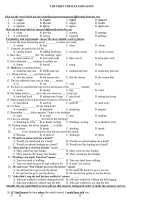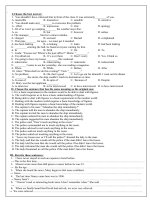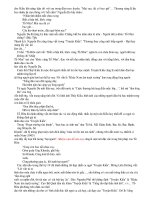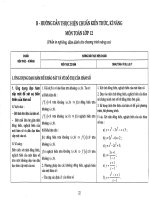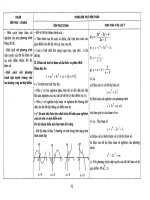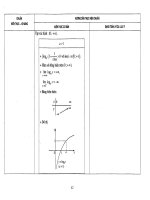REVISION 12 PART pdf
Bạn đang xem bản rút gọn của tài liệu. Xem và tải ngay bản đầy đủ của tài liệu tại đây (30.92 KB, 4 trang )
1
REVISION 12
PART 1. VERB TENSE & FORM
1. (1. Bear) __________________ in Scotland in 1847, Alexander Bell (2. become) __________________
interested very early in the methods of human communication. He (3. influence) __________________
by his father and grandfather, who (4. spend) __________________ years working with deaf people and
those with faulty speech. Bell’s father even (5. go) __________________ so far as to develop a system of
so-called “visible speech” for the deaf. He (6. use) __________________ sketches of the different
positions of the lips and tongue. This science of visible speech (7. form) __________________ the
foundation of young Bell’s knowledge of the mechanics of human speech. But the young boy’s
knowledge of other subjects (8. not/ advance) __________________ quite as rapidly.
2. While I (1. walk) __________________ across the campus the other day, I (2. meet)
__________________ my old friend, John, whom I (3. not see) __________________ since July 10.
Naturally we (4. stop) __________________ (5. talk) __________________ to each other for a few
minutes. I asked him how he (6. do) __________________ in his classes this semester.
3. Jack London (1. bear) __________________ in San Francisco January 12, 1876. He (2. begin)
__________________ his education at the university of California, but (3. not finish)
__________________ it there, he (4. write) __________________ a lot of adventure books. He (5.
travel) __________________ much, and his experience in his trips (6. help) __________________ him
write many famous books.
4. Mary (1. have) __________________ to go to New York last week, but she almost (2. miss)
__________________ the plane. She (3. stand) __________________ in the queue at the check-in desk
when she suddenly (4. realize) __________________ that she (5. leave) her passport at home.
Fortunately, she (6. not live) __________________ very far from the airport so she (7. have)
__________________ time to go back home to get the passport. She (8. get) __________________ back
to the airport just in time for her flight.
5. Rob Fellow (1. come) __________________ from England. He (2. come) __________________ to Paris
six months ago to learn French. He (3. start) __________________ learning French at school in England
when he was eleven so he (4. learn) __________________ it for nearly 10 years. He just (5. take)
__________________ an exam. If he passes, he (6. move) __________________ in to the next class. He
(7. be) __________________ excited today because his parents (8. come) __________________
tomorrow to stay with him for a few days.
6. A: Tell us what happened to you yesterday?
B: I (1. walk) __________________ along Piccadilly when I (2. realize) __________________ that a
man with a black heard, whom I (3. see) __________________ three times already that afternoon, (4.
follow) __________________ me. I (5. be) __________________ very annoyed, and at last I (6. stop)
__________________ him and (7. ask) __________________ him why he (8. follow)
__________________ me. The man (9. apologize) __________________ and told __________________
me he (10. mistake) __________________ me for one of his friends.
7. Last Sunday. Mrs. Hay (1. drive) __________________ along a small country road when she (2. see)
__________________ a man at the side of the road. He (3. wave) __________________ and pointing at
his car. Mrs. Hay (4. stop) __________________ and (5. ask) __________________ the man if he (6. be)
__________________all right. “My car’s broken down”, said the man.
8. I’d just parked my car in the street near a football stadium in Liverpool. It (1. be) __________________
ten minutes before the start of the match and I (2. be) __________________ in a hurry. Two little boys
(3. come) __________________ up to me and (4. say) __________________ , “Give me some money
and we (5. look) __________________ after your car while you are at the match. I (6. tell)
__________________ them to clear off, and one, of them (7. look) __________________ at me with big,
round eyes and said, “Unless you (8. give) __________________ us the money, something might happen
to your car while you are away, you know, a scratch or a flat or something like that.”
9. He (1. run) __________________ as fast as he could, but he realized he was not strong enough (2. be)
__________________ a good marathon runner. In the distance he could just make out the shapes of the
(3. lead) __________________ runners, (4. get) __________________ further ahead every minute.
10. Every day you can (1. hear) __________________ something interesting at school. When you come
home after classes, you often (2. tell) __________________ your parents what you (3. hear)
__________________ and (4. see) __________________ at school.
11. Two friends went on a trip to London. They (1. enter) __________________ a restaurant for dinner. On
the table (2. stand) __________________ a jar of mustard. Not having seen mustard before, one of them
(3. take) __________________ a spoonful into his mouth. Tears immediately filled his eyes and his
friend asked him what he (4. cry) __________________ about.
2
12. In two minutes I (1. be) __________________ up the tree, but it was very difficult (2. get)
__________________ to the nest. When at last I got there and (3. can look) __________________ into
the nest, I (4. see) __________________ the two young eagles and also some food for them - meat and
fish. When I tried (5. take) __________________ the young eagles out of the nest, I suddenly (6. feel)
__________________ a terrible pain in the back of my head. I (7. look) __________________ round-and
(8. see) __________________ the mother eagle. And she (9. be) __________________ ready to make a
second attack. You must (10. know) __________________ how strong these eagles are.
13. Eric (1. bear) __________________ in 1903 in India where his father worked for the civil service. The
family (2. move) __________________ to England in 1907 and in 1917 Eric (3.
enter)__________________ Eton where he (4. contribute) __________________ regularly to the college
magazine. His first article (5. appear) __________________ in Lemon in October 1928 while he (6. live)
__________________ in Paris.
14. Jack Cooper (1. be) __________________ a production manager at Weston Aeronautics for ten years
now. He (2. live) __________________ in a small house in the suburbs of Bristol with his wife, Peggy.
Now Weston (3. expand) __________________ into Europe and they (4. build) __________________ a
new factory in Toulouse.
15. When the train reached the sixth station, Tom (1. get) __________________ off, feeling relieved that his
journey (2. be) __________________ so easy. But he (3. be) __________________ alarmed to see that
he (4. get) __________________ off at a station that he (5. hear) __________________ . He (6. not
know) __________________ what to do. He (7. explain) __________________ his difficulty to a man
who (8. stand) __________________ on the platform. With a look of amusement on his face, the man (9.
tell) __________________ Tom that he (10. travel) __________________ on a train going in the wrong
direction.
PART 2. SENTENCE TRANSFORMATION
1. We haven’t been to a concert for over a year.
The last time ___________________________________________________________________________
2. Your birthday party was the last time I really enjoyed myself.
I _____________________________________________________________________________________
3. It’s nearly twenty years since my father saw his brother.
My father ______________________________________________________________________________
4. Jim to Scotland last Friday and is still there.
Jim has ________________________________________________________________________________
5. When did you last ride a bike?
How long is it __________________________________________________________________________
6. The last time I went swimming was when I was in France.
I haven’t _______________________________________________________________________________
7. You haven’t tidied up this room for weeks.
It’s ___________________________________________________________________________________
8. He was last in touch with me three weeks
He hasn’t ______________________________________________________________________________
9. Mr. John hasn’t visited France since 1990.
Mr. John last ___________________________________________________________________________
10. It last rained three weeks
It’s ___________________________________________________________________________________
11. I haven’t eaten this kind of food before.
This is the first _________________________________________________________________________
12. What a pity you failed your driving test!
I wish _________________________________________________________________________________
13. It’s a pity that you’re going away so soon.
I wish _________________________________________________________________________________
14. I’m sorry I didn’t phone him yesterday.
I wish _________________________________________________________________________________
15. She knows a lot more about it than I do.
I don’t know __________________________________________________________________________
16. Jane is a better cook than Betty.
Betty can’t ___________________________________________________________________________
17. Dave is younger than he looks.
Dave isn’t ___________________________________________________________________________
18. I didn’t spend as much money as my friend (did).
3
My friend ____________________________________________________________________________
19. He doesn’t know them as well as I do.
I know _______________________________________________________________________________
20. It’s still cold but it was colder yesterday.
It isn’t _______________________________________________________________________________
21. The children couldn’t go swimming because the sea was very rough.
The sea was too ________________________________________________________________________
22 We didn’t have enough money so we didn’t go on holiday
If we ________________________________________________________________________________
23. We got lost because we didn’t have a map.
If we ________________________________________________________________________________
24. The bridge was so low the bus couldn’t go under it.
It was _______________________________________________________________________________
25. It was so late that nothing could he done.
It was too ___________________________________________________________________________
26. He could not afford to buy the car.
The car ______________________________________________________________________________
27. That restaurant is so dirty that no one wants to cat there.
It is such ______________________________________________________________________________
28. The test was too difficult for pupils to do.
The test ______________________________________________________________________________
29. Phone now or you may be late.
You may ______________________________________________________________________________
30. I advise you to put your money in a bank.
You’d ________________________________________________________________________________
31. Why don’t you meet to discuss the price?
I suggest ______________________________________________________________________________
32. I would prefer you to deliver the package on Monday.
I’d rather _____________________________________________________________________________
KEYS TO VERB TENSE & FORM - 12
1.
1. born
2. became
3. was influenced
4. spent
5. went
6. used
7. formed
8. didn’t advanced
2.
1. was walking 2. met 3. hadn’t seen 4. stopped 5. to talk 6. had done
3.
1. was born 2. began 3. didn’t finish 4. wrote 5. travelled 6. helped
4.
1. had
2. missed
3. was standing
4. realized
5. had left
6. doesn’t live
7. had
8. got
5.
1. comes
2. came
3. started
4. has been learning
5. has just taken
6. will move
7. is
8. will come/ are coming
6.
1. was walking
2. realized
3. had seen
4. was following
5. was
6. asked
7. had been following
8. apologized
9. told
10. had mistaken
7.
1. was driving 2. saw 3. was waving 4. stopped 5. asked 6. was
8.
1. was
2. was
3. came
4. said
5. will look
6. told
7. looked
8. give
9.
1. was running 2. to be 3. leading 4. getting
10.
1. hear 2. tell 3. have heard 4. seen
11.
4
1. entered 2. stood 3. took 4. was crying
12.
1. was
2. to get
3. could look
4. saw
5. to take
6. felt
7. looked
8. saw
9. was
10. must know
13.
1. was born 2. moved 3. entered 4. contributed 5. appeared 6. was living
14.
1. has been 2. is living 3. is expanding 4. have built
15.
1. got
2. was
3. was
4. got
5. had never heard of
6. didn’t know
7. explained
8. was standing
9. told
10. had travelled
A.
1. The last time I went to a concert was over a year ago.
2. I haven’t really enjoyed myself since your birthday party.
3. My father hasn’t seen his brother for nearly twenty years.
4. — Jim has been in Scotland since last Friday.
- has gone to Scotland since last Friday.
5. How long is it since you (lost) rode a bike?
6. — I haven’t been swimming since I was in France.
— I haven’t gone swimming since I was in France.
7. It’s weeks since you tidied up this room.
8. He hasn’t been in touch with me for three weeks.
9. Mr. John last visited France in 1990.
10. It’s three weeks since it rained.
11. This is the first time I have eaten this kind of food.
B. 12. I wish you had passed / hadn’t failed your driving test.
13. I wish you weren’t going away so soon.
14. I wish I had phoned him yesterday.
15. I don’t know as much about it as she does.
16. Betty can’t cook as well as Jane.
17. Dave isn’t as old as he looks.
18. My friend spent more money than I did.
19. I know them better than him (he does).
20. It isn’t as cold today as it was yesterday.
D. 21. The sea was too rough for the children to go swimming.
22. If we had had enough money, we could have gone on holiday.
23. If we had had a map, we couldn’t have got lost.
24. It was such a low bridge (that) the bus couldn’t go under it.
25. — It was too late for anything to be done.
— It was too late to do anything.
26. — The car was too expensive for him.
— The car cost more than he could afford.
27. It is such a dirty restaurant that no one wants to eat there.
28. The test was so difficult that pupils couldn’t do it.
29. You may be late if you don’t phone now.
30. You’d better put your money in a bank.
31. — I suggest that you should have a meeting.
— I suggest that you should meet to discuss the price.
32. I’d rather you delivered the package on Monday.

